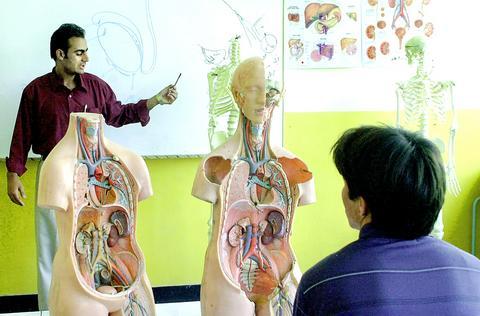Armed with shovels, bags and flashlights, five students creep through a dark Kabul cemetery on a gruesome midnight hunt they hope will help them in their studies.
Lacking cash to buy medical skeletons, the medical students have been forced to extreme measures in order to continue the lessons they hope will turn them into Afghanistan's next generation of doctors.
With more than 80,000 people killed in the 1992-1996 civil war, many of the victims were hastily buried in this west Kabul cemetery and it is their bones the students search for to help them learn anatomy.

PHOTO: AFP
"It was a scary and risky thing to do," one of them said. "But we had no other choice, we were told we could not attend the next anatomy lesson if we didn't have skeletons.
"We knew we would have few facilities or permission to work on bodies for autopsy at our university, but at least by digging up graves we can find skeletons," he said.
Much has changed in Afghanistan since the fall of the hardline Islamic Taliban regime in late 2001, but for medical students, procuring a skeleton remains a major problem.
The Japanese government recently donated some much-needed anatomical models to Kabul University, including a male and a female skeleton and models of musculature and other organs.
But medical students still need to buy or otherwise obtain a skeleton for use during their course, an academic at the university's Medical Institute who requested anonymity said.
Lacking the funds to buy a set of bones, many students are forced to turn to desperate means to supply their need, second-year student Saleh Ahmad confirmed.
And outside the capital the situation is similar in medical schools in places like eastern Nangarhar.
"I still have my skeleton that me and my friends got from digging in Nangarhar province," first-year medical student Mohammed Rafi said. "Most students still have to provide skeletons for themselves."
Mohammed Shafi, who took part in a midnight skeleton grab four years ago, said then their institute did not have a single skeleton and they had little choice but to rob a grave and risk heavy punishment if caught by the Taliban.
Apart from the risk of being caught, their efforts were sometimes in vain.
"First we opened three graves and that was a useless effort -- they were too old and the bones had all worn out so we had to open several others," said Mohammed Homayoon. "Then we opened four graves and managed to get four sets of skeletons," he said.
Some of the bones bore the scars of the war-ravaged country's violent past.
One of the skulls they dug up was totally blackened, indicating the victim had been burned, he said.
"God knows how cruelly he was killed by fighters in the civil war," he said.
Once they had the bones in their possession, the students then had to clean, sterilize and varnish them. Without professional skills or equipment they undertook the grisly task in their homes.
"I was not aware that this boiling skeleton would make a terrible smell," Shafi said.
"My mother came out to the backyard and saw the skull and bones boiling in the pan with this terrible smell and when saw me and my friend standing there she immediately fainted."

A fire caused by a burst gas pipe yesterday spread to several homes and sent a fireball soaring into the sky outside Malaysia’s largest city, injuring more than 100 people. The towering inferno near a gas station in Putra Heights outside Kuala Lumpur was visible for kilometers and lasted for several hours. It happened during a public holiday as Muslims, who are the majority in Malaysia, celebrate the second day of Eid al-Fitr. National oil company Petronas said the fire started at one of its gas pipelines at 8:10am and the affected pipeline was later isolated. Disaster management officials said shutting the

US Vice President J.D. Vance on Friday accused Denmark of not having done enough to protect Greenland, when he visited the strategically placed and resource-rich Danish territory coveted by US President Donald Trump. Vance made his comment during a trip to the Pituffik Space Base in northwestern Greenland, a visit viewed by Copenhagen and Nuuk as a provocation. “Our message to Denmark is very simple: You have not done a good job by the people of Greenland,” Vance told a news conference. “You have under-invested in the people of Greenland, and you have under-invested in the security architecture of this

Japan unveiled a plan on Thursday to evacuate around 120,000 residents and tourists from its southern islets near Taiwan within six days in the event of an “emergency”. The plan was put together as “the security situation surrounding our nation grows severe” and with an “emergency” in mind, the government’s crisis management office said. Exactly what that emergency might be was left unspecified in the plan but it envisages the evacuation of around 120,000 people in five Japanese islets close to Taiwan. China claims Taiwan as part of its territory and has stepped up military pressure in recent years, including

UNREST: The authorities in Turkey arrested 13 Turkish journalists in five days, deported a BBC correspondent and on Thursday arrested a reporter from Sweden Waving flags and chanting slogans, many hundreds of thousands of anti-government demonstrators on Saturday rallied in Istanbul, Turkey, in defence of democracy after the arrest of Istanbul Mayor Ekrem Imamoglu which sparked Turkey’s worst street unrest in more than a decade. Under a cloudless blue sky, vast crowds gathered in Maltepe on the Asian side of Turkey’s biggest city on the eve of the Eid al-Fitr celebration which started yesterday, marking the end of Ramadan. Ozgur Ozel, chairman of the main opposition Republican People’s Party (CHP), which organized the rally, said there were 2.2 million people in the crowd, but